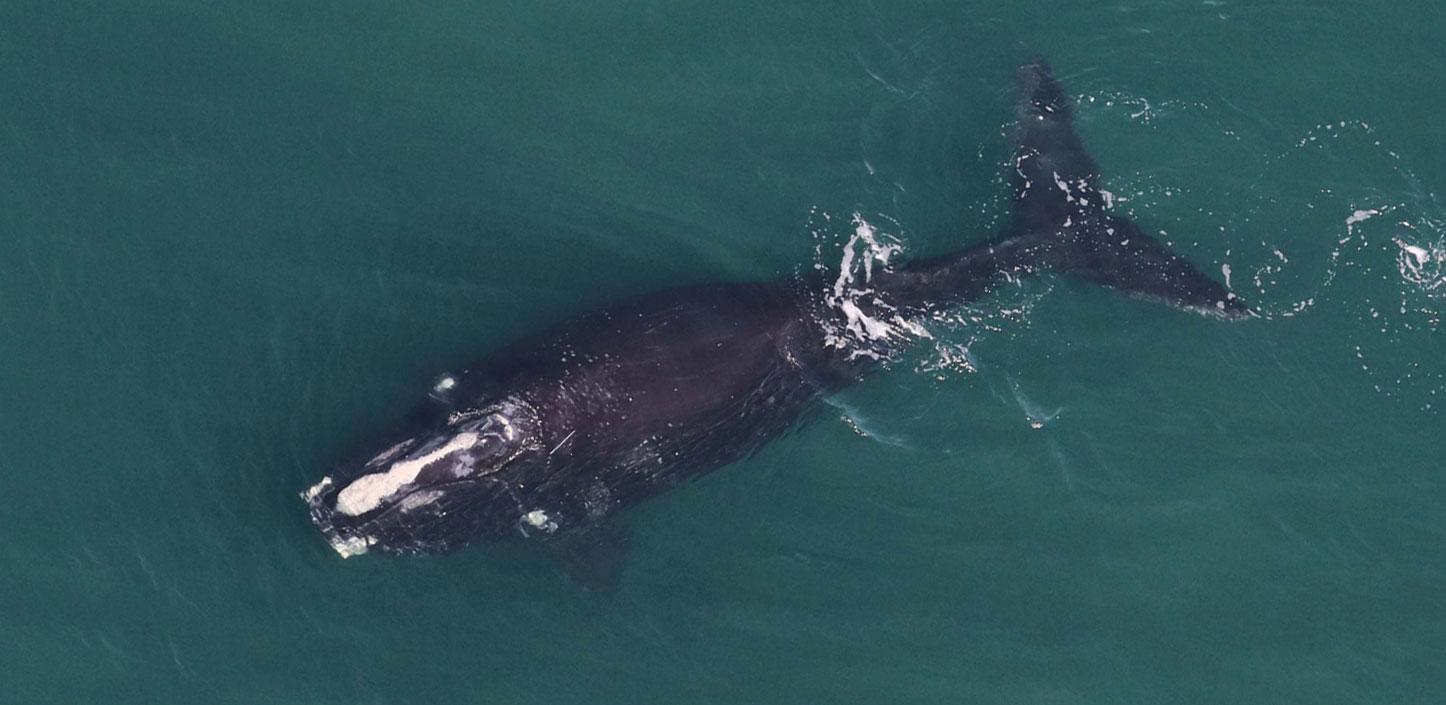
NFWF Announces $500,000 in New Support to Help Conserve North Atlantic Right Whales
Investments Will Reduce Entanglement Risks for Imperiled Marine Wildlife
Washington, D.C. (November 16, 2020) – The National Fish and Wildlife Foundation (NFWF) today announced nearly $500,000 in investments to reduce threats to North Atlantic right whales and other marine life off the coast of New England. These critical investments include $427,000 in grants and $71,000 in grantee matching contributions.
The grants were awarded through the Electronic Monitoring and Reporting Grants Program and the Fishing for Energy Program. NFWF is working in partnership with Shell and NOAA to provide funding to support gear advancement and to improve the region’s ability to transition to on-call gear that does not require a buoy-line.
Marine animals such as right whales can become entangled in lines used to mark the location of fishing nets or traps in the ocean. Innovative technology can offer a viable alternative to track gear while reducing risks to whales.
“NFWF is able to bring a comprehensive approach to right whale entanglement through two programs that focus on sustainable fishing,” said Jeff Trandahl, executive director and CEO of NFWF. “These two projects will help identify socioeconomic and other considerations of implementing new standards throughout the region, while at the same time continuing to refine the technical aspects of this gear innovation that holds so much promise for improving the future for North Atlantic right whales.”
"NOAA Fisheries has a dual responsibility to maintain sustainable fisheries and conserve protected species such as the North Atlantic right whale,” said Chris Oliver, NOAA Fisheries Assistant Administrator. “We are working with a strong coalition of partners, including fishermen, to make investments and find solutions to reduce the entanglement threat fishing gear poses to this iconic species."
“Shell is a proud and active member in the communities where we operate,” said James Cotter, Shell’s General Manager Americas of Offshore Wind. “We look forward to building on our partnerships with NOAA and NFWF to further innovate technology that enhances the sustainability of our oceans and leads to the conservation of the North Atlantic right whale.”
The Electronic Monitoring and Reporting Grant Program seeks to advance NOAA’s sustainable fisheries goals to partner with fishermen, stakeholders, state agencies and others to systematically integrate electronic technology into fisheries management, including modernizing systems to support implementation and use of these technologies. The Fishing for Energy program works to reduce the amount of derelict fishing gear in and around our coastal waterways by supporting strategies to reduce the impacts of derelict fishing gear to marine and coastal environments and navigational safety.
The projects supported by the two grants announced today will advance the development and implementation of innovative gear tracking technology:
Grant: Developing a Framework for Ropeless Fishing in New England
Grantee: Massachusetts Division of Marine Fisheries
Total Project Budget: $201,207
Grant Description: Characterize the issues and challenges associated with the integration of on-call or ropeless fishing gear technology into New England fisheries. Project will evaluate the issues using semi-structured interviews and workshops with experts in the field, synthesize perspectives, and analyze the technical, legal, and socio-economic challenges and opportunities to develop a set of recommendations for further work. This project is funded through the Electronic Monitoring and Reporting Grants program.
Grant: Reducing Entanglements of Critically Endangered Marine Life with Gear Tracking Technology
Grantee: Blue Planet Strategies
Total Project Budget: $296,816
Grant Description: Develop an innovative gear tracking technology to be tested in the New England groundfish fishery designed to track gear anchored at the sea floor to surface buoys. Project will reduce entanglement of critically endangered marine life, reduce the amount of derelict gear and advance gear tracking technology. This project is funded through the Fishing for Energy program.
For additional information about these two grant programs, please see the links below:
Electronic Monitoring and Reporting Grants Program
Fishing for Energy Program
About the National Fish and Wildlife Foundation
Chartered by Congress in 1984, the National Fish and Wildlife Foundation (NFWF) protects and restores the nation’s fish, wildlife, plants and habitats. Working with federal, corporate and individual partners, NFWF has funded more than 5,000 organizations and generated a total conservation impact of $6.1 billion. Learn more at www.nfwf.org.
About NOAA
NOAA is celebrating 50 years of science, service, and stewardship in fulfilling a mission to understand and predict changes in the Earth's environment, from the depths of the ocean to the surface of the sun, and to conserve and manage our coastal and marine resources. Join us on Twitter, Facebook, Instagram and our other social media channels. Visit our news and features page.
About Shell Oil Company
Shell is proud to support the Fishing for Energy program, an initiative that reflects Shell's values and commitment to the environment and wildlife, as well as strengthens its ties to coastal and fishing communities. Shell recognizes the challenges and risks posed to marine life, including mammals and birds, by derelict fishing gear, particularly off the New England coast. With the help of Shell funding, NFWF and the program partners are able to provide additional support to help keep our coastal and marine environments clean and healthy for all wildlife.
Shell companies have operations in more than 70 countries and territories with businesses including oil and gas exploration and production; production and marketing of liquefied natural gas and gas to liquids; manufacturing, marketing and shipping of oil products and chemicals and renewable energy projects. Over the past 100 years, Shell has helped preserve and protect habitat and species through hundreds of conservation projects and initiatives. Collaborating with key organizations and environmental NGOs has enabled Shell to leverage its efforts to ensure the highest possible impact – including the protection of more than 13 million acres of wetlands.
###
Contact:
Rob Blumenthal, 202-857-0166, rob.blumenthal@nfwf.org